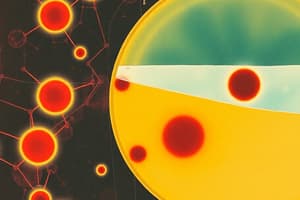Podcast
Questions and Answers
What primarily differentiates hepatic porphyrias from erythropoietic porphyrias?
What primarily differentiates hepatic porphyrias from erythropoietic porphyrias?
- The tissue where heme biosynthesis is affected (correct)
- The presence of neuro-psychiatric symptoms
- The type of skin lesions present
- The age at which symptoms manifest
Which enzyme deficiency is NOT associated with symptoms primarily related to abdominal and neuro-psychiatric signs?
Which enzyme deficiency is NOT associated with symptoms primarily related to abdominal and neuro-psychiatric signs?
- Deaminase
- ALAD (correct)
- Porphobillinogen
- PBG Synthase
The reactive oxygen species formation causing oxidative damage to skin cells in porphyria is a result of exposure to which type of light?
The reactive oxygen species formation causing oxidative damage to skin cells in porphyria is a result of exposure to which type of light?
- Visible light (correct)
- Infrared light
- Ultraviolet light
- X-ray radiation
What is the primary clinical feature of acquired porphyrias, such as those caused by lead poisoning?
What is the primary clinical feature of acquired porphyrias, such as those caused by lead poisoning?
Which of the following factors does NOT influence the symptoms seen in porphyrias?
Which of the following factors does NOT influence the symptoms seen in porphyrias?
What is the primary porphyrin compound found in humans involved in hemoglobin synthesis?
What is the primary porphyrin compound found in humans involved in hemoglobin synthesis?
Which of the following is NOT a symptom associated with porphyria?
Which of the following is NOT a symptom associated with porphyria?
Which type of porphyrin is considered to be physiologically important for humans?
Which type of porphyrin is considered to be physiologically important for humans?
In the context of porphyrias, which of these factors could lead to misinterpretation as 'vampiric' phenomena?
In the context of porphyrias, which of these factors could lead to misinterpretation as 'vampiric' phenomena?
What surgical investigations were proposed for King George III that were complicated by his medication?
What surgical investigations were proposed for King George III that were complicated by his medication?
What structure is formed by the linkage of four pyrrole rings in porphyrins?
What structure is formed by the linkage of four pyrrole rings in porphyrins?
Which of the following enzymes is NOT associated with porphyrins?
Which of the following enzymes is NOT associated with porphyrins?
Which symptom is specifically characterized as a derivative of porphyria, tied to excess hair growth?
Which symptom is specifically characterized as a derivative of porphyria, tied to excess hair growth?
Which condition is known to be caused by a deficiency in the enzyme ALA dehydratase?
Which condition is known to be caused by a deficiency in the enzyme ALA dehydratase?
What is the consequence of heavy metal exposure on heme synthesis?
What is the consequence of heavy metal exposure on heme synthesis?
Which form of porphyria is most closely associated with excess production and excretion of ALA and PBG?
Which form of porphyria is most closely associated with excess production and excretion of ALA and PBG?
What is the primary function of erythropoietin in the body?
What is the primary function of erythropoietin in the body?
How does an excess of free heme influence ALA synthase activity?
How does an excess of free heme influence ALA synthase activity?
What is the role of Vitamin B6 in heme synthesis?
What is the role of Vitamin B6 in heme synthesis?
Which of these is NOT classified as a type of porphyria?
Which of these is NOT classified as a type of porphyria?
What is the final product of the heme biosynthesis pathway?
What is the final product of the heme biosynthesis pathway?
Flashcards
Porphyrin
Porphyrin
A cyclic compound composed of four pyrrole rings linked by methenyl bridges.
Heme
Heme
A porphyrin that binds to iron (Fe+2).
Porphyria
Porphyria
A genetic disorder affecting the synthesis of porphyrins, leading to a buildup of specific porphyrin precursors in the body.
Porphyrias
Porphyrias
Signup and view all the flashcards
Congenital Erythropoietic Porphyria
Congenital Erythropoietic Porphyria
Signup and view all the flashcards
Acute Intermittent Porphyria
Acute Intermittent Porphyria
Signup and view all the flashcards
Erythropoietic Protoporphyria
Erythropoietic Protoporphyria
Signup and view all the flashcards
Heme synthesis defects
Heme synthesis defects
Signup and view all the flashcards
Erythropoietic Porphyrias
Erythropoietic Porphyrias
Signup and view all the flashcards
Hepatic Porphyrias
Hepatic Porphyrias
Signup and view all the flashcards
Photosensitivity
Photosensitivity
Signup and view all the flashcards
Porphyria with Enzyme Defect Before Tetrapyrrole Synthesis
Porphyria with Enzyme Defect Before Tetrapyrrole Synthesis
Signup and view all the flashcards
ALA Synthase
ALA Synthase
Signup and view all the flashcards
Porphobilinogen (PBG)
Porphobilinogen (PBG)
Signup and view all the flashcards
Erythropoietin
Erythropoietin
Signup and view all the flashcards
ALA-dehydratase Deficiency Porphyria (ADP)
ALA-dehydratase Deficiency Porphyria (ADP)
Signup and view all the flashcards
Erythropoietic Protoporphyria (EPP)
Erythropoietic Protoporphyria (EPP)
Signup and view all the flashcards
Congenital Erythropoietic Porphyria (CEP)
Congenital Erythropoietic Porphyria (CEP)
Signup and view all the flashcards
Study Notes
Hemoglobin Synthesis and Porphyrias
- The presentation covered the synthesis of hemoglobin and porphyrias.
- Learning objectives included explaining the pathway of hemoglobin synthesis, listing abnormalities of hemoglobin synthesis, classifying porphyrias, and discussing porphyrias.
- Porphyrias are genetic diseases involving impaired heme synthesis.
- The presentation included examples of porphyria symptoms, such as red-brown teeth, hair growth abnormalities, skin mutilation, and disfigurement.
- Porphyrias are not a "vampire disease", despite historical misconceptions.
- King George III, the British monarch, possibly suffered from a porphyria.
- Porphyrins are cyclic compounds that usually bind iron; heme is the most common porphyrin in humans, having an iron (Fe²⁺) group.
- Hemoglobin, myoglobin, cytochromes, catalase, and NOS are proteins that contain heme as a prosthetic group.
Porphyrins
- Porphyrins are cyclic compounds consisting of four pyrrole rings linked by methenyl bridges.
- Side chains, typically acetate (A) and propionate (P), attach to the pyrrole rings, determining porphyrin type.
- Type III porphyrins are crucial for humans, while types I, II and IV are less prominent.
- Porphyrin structure and function are determined by the combination of side chains.
Heme Synthesis
- Heme is a porphyrin complex with iron at its center.
- The process takes place in the mitochondria and cytoplasm of cells, especially the liver and bone marrow.
- The initial steps leading to heme synthesis occur within the mitochondria.
- 10% of heme synthesis in the body occurs in the liver; most of the process is within the bone marrow (erythroid cells; ~85%).
- There's a series of enzymatic reactions synthesizing the porphyrin rings in distinct sites within cells.
- Steps include ALA (amino levulinic acid) synthesis, formation of porphobilinogen (PBG) and intermediates including hydroxymethylbilane (HMB).
- Then, porphyrins cycle from the mitochondria through different parts of the cell.
- These reactions involve catalysis by different enzymes.
- Heme synthesis is inhibited by heavy metals like lead.
Porphyria Classification and Case Studies
- Porphyrias can be inherited or acquired.
- Porphyria is an inherited error in metabolism that affects heme synthesis.
- The severity and manifestations of porphyrias differ depending on the specific enzyme defect and the affected tissues (e.g., liver or erythrocytes).
- Porphyrias can result in a buildup of porphyrin precursors such as porphobilinogen (PBG) and/or porphyrins in the blood, and urine.
- Porphyrias can also lead to symptoms of neuropsychiatric conditions (e.g. abdominal pain, neurological disturbances).
- A case study of a child presenting with learning difficulties and a habit of eating paint chips was given.
- A case of a 50-year-old experiencing partial complex seizures, along with skin lesions and abnormal uroporphyrin levels, was presented..
Heme Synthesis Overview
- Heme synthesis is a multi-step process that produces heme, the prosthetic group in hemoglobin and other proteins.
- The overall pathway entails the synthesis of tetrapyrroles (HMB, uroporphyrinogen I and II, coproporphyrinogen I and II, Protoporphyrin IX) through a series of enzymatic reactions.
- Steps occur in distinct cell compartments (e.g., cytoplasm and mitochondria)
Inhibition of Heme Synthesis
- Hematin inhibits ALA synthase, thus heme synthesis when globin chains are absent.
- Heavy metals inhibit various enzymes, such as ALA synthase and ferochelatases, interfering with normal heme production.
- Lead poisoning has various effects, including neurological ones, stemming from the build-up of ALA.
Porphyria Cutanea Tarda (PCT)
- PCT is the most common form of porphyria.
- Caused by a deficiency of uroporphyrinogen decarboxylase.
- Clinical onset is typically late (often in the 4th or 5th decade).
- Characterized by various symptoms, notably abnormal urine color (red-brown) reacting to UV light.
- Symptoms can be aggravated by iron overload, alcohol consumption, and hepatitis.
Erythropoietic Porphyria
- Congenital Erythropoietic Porphyria (CEP) is caused by a deficiency in uroporphyrinogen III synthase.
- Symptoms include: abnormal urine color (pink to red), photosensitivity, and accumulation of uroporphyrinogen I (and coproporphyrinogen I).
- Patients with Erythropoietic Porphyria show photosensitivity due to porphyrin accumulation.
General points relating to all porphyrias
- Porphyrias are hereditary whereas lead exposure causes an acquired porphyria.
- Porphyrias can be separated into groups, based on the location of synthesis and the types of affected enzymes.
- Different types of porphyrias affect specific steps in heme synthesis, leading to varying symptoms and accumulation patterns of various substances.
- Deficiency in any of these enzymes can interfere with the formation of porphyrins, which are intermediates on the heme synthesis pathway
- Understanding porphyrias is relevant to medicine and potentially the arts.
Studying That Suits You
Use AI to generate personalized quizzes and flashcards to suit your learning preferences.




